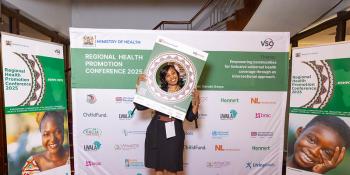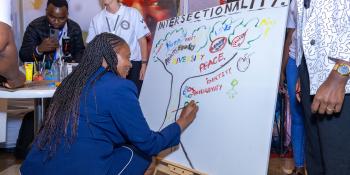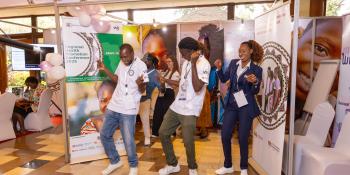As new revelations about abuse and harassment within our sector come to light, we at VSO have also been reflecting on what ‘zero tolerance’ means to us as an organisation.
For a complex, global organisation with thousands of people - often located in remote parts of the world - it can never, sadly, mean zero incidents. This means we have to work additionally hard to ensure our staff and those people we serve are kept safe.
At VSO, we have embraced a culture where zero tolerance means ensuring everyone is clear about what is appropriate and acceptable and what is not. It is about ensuring all our colleagues are encouraged to speak out and challenge inappropriate behaviours wherever they see them. It means continually looking to improve the processes and practices we have in place to keep both our staff, and the most vulnerable people we help every day, safe from harm of any kind.
We know that these systems and processes are working. Out of nearly 800 employees, eight allegations of sexual misconduct have been reported by staff against other members of staff at VSO since 2015. While none of these incidents involve beneficiaries, they were nevertheless investigated. Six of the complaints were upheld leading to those individuals having their contracts terminated, and one investigation is still ongoing. As these cases demonstrate, we will act swiftly to dismiss offenders.
As a development organisation, we have regular contact with the vulnerable people we serve. This means we need to go much further than many organisations, and this is particularly true when it comes to the safeguarding measures we put in place. Complacency in the face of recent news reports is simply not an option. This is why we have reviewed our processes and are already introducing additional safeguarding measures.
We are looking again at our code of conduct to ensure it is as comprehensive as possible and we will put in place a way for employees and volunteers to regularly acknowledge that they are compliant with and understand its implications.
We will be working with other aid charities and the UK Department for International Development to put in place an international registration system of aid workers, so that those found guilty of wrongdoing will be excluded from working with us or any other aid organisation.
And we support calls for an international police records background checking system to be managed by the international police cooperation organisation, Interpol.
I’ve decided that the review of our safeguarding practice which I asked for last week will be carried out by independent, external professionals. The results of this review will be shared with the UK Government and be used to further strengthen our safeguarding work at VSO.
No part of VSO will be immune to this scrutiny. Anyone at VSO who would like to highlight issues to the independent reviewer will be free to do so, and will be able to do so confidentially.
As the #MeToo campaign has all too painfully demonstrated, we don’t have to scratch far under the veneer of society to find those who have been exploited and abused. The fact that abuse has also been uncovered within the very charities who are there to fight on behalf of the world’s most vulnerable has left the public reeling.
No institution is sacred. But all of us at VSO want to reassure our supporters that we continue to work hard to ensure that our culture and our practice lives up to our commitment to zero tolerance. This means looking out for, challenging, reporting and dealing with any form of inappropriate behaviour, no matter who is involved or where it takes place.
Read more

In photos: Our Regional Health Promotion Conference 2025
Check out some of our favourite photos from Regional Health Promotion Conference (RHPC25). This event sought to reimagine Universal Health Coverage through the lens of intersectionality.

Using intersectionality to create healthy beginnings and hopeful futures
World Health Day brings global attention to the urgent need to end preventable maternal and newborn deaths. Learn more about how our Regional Health Promotion Conference is tackling these issues head on.

Highlights from the Regional Health Promotion Conference 2025
The Regional Health Promotion Conference 2025 reimagined Universal Health Coverage (UHC) through the lens of intersectionality, by bringing together experts from across East Africa and beyond.
